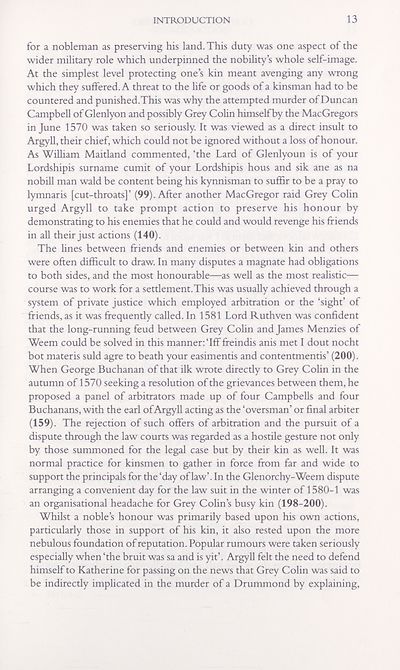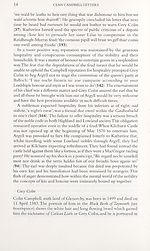Series 5 > Campbell Letters 1559-1583
(32) Page 13
Download files
Complete book:
Individual page:
Thumbnail gallery: Grid view | List view

INTRODUCTION
13
for a nobleman as preserving his land. This duty was one aspect of the
wider military role which underpinned the nobility’s whole self-image.
At the simplest level protecting one’s kin meant avenging any wrong
which they suffered. A threat to the life or goods of a kinsman had to be
countered and punished.This was why the attempted murder of Duncan
Campbell of Glenlyon and possibly Grey Cohn himself by the MacGregors
in June 1570 was taken so seriously. It was viewed as a direct insult to
Argyll, their chief, which could not be ignored without a loss of honour.
As William Maitland commented, ‘the Lard of Glenlyoun is of your
Lordshipis surname cumit of your Lordshipis hous and sik ane as na
nobill man wald be content being his kynnisman to suffir to be a pray to
lymnaris [cut-throats]’ (99). After another MacGregor raid Grey Colin
urged Argyll to take prompt action to preserve his honour by
demonstrating to his enemies that he could and would revenge his friends
in all their just actions (140).
The lines between friends and enemies or between kin and others
were often difficult to draw. In many disputes a magnate had obligations
to both sides, and the most honourable—as well as the most realistic—
course was to work for a settlement. This was usually achieved through a
system of private justice which employed arbitration or the ‘sight’ of
friends, as it was frequently called. In 1581 Lord Ruthven was confident
that the long-running feud between Grey Colin and James Menzies of
Weem could be solved in this manner:‘Iff freindis anis met I dout nocht
bot materis suld agre to beath your easimentis and contentmentis’ (200).
When George Buchanan of that ilk wrote directly to Grey Cohn in the
autumn of 1570 seeking a resolution of the grievances between them, he
proposed a panel of arbitrators made up of four Campbells and four
Buchanans, with the earl of Argyll acting as the ‘oversman’ or final arbiter
(159). The rejection of such offers of arbitration and the pursuit of a
dispute through the law courts was regarded as a hostile gesture not only
by those summoned for the legal case but by their kin as well. It was
normal practice for kinsmen to gather in force from far and wide to
support the principals for the ‘day of law’. In the Glenorchy-Weem dispute
arranging a convenient day for the law suit in the winter of 1580-1 was
an organisational headache for Grey Colin’s busy kin (198-200).
Whilst a noble’s honour was primarily based upon his own actions,
particularly those in support of his kin, it also rested upon the more
nebulous foundation of reputation. Popular rumours were taken seriously
especially when ‘the bruit was sa and is yit’. Argyll felt the need to defend
himself to Katherine for passing on the news that Grey Colin was said to
be indirectly implicated in the murder of a Drummond by explaining,
13
for a nobleman as preserving his land. This duty was one aspect of the
wider military role which underpinned the nobility’s whole self-image.
At the simplest level protecting one’s kin meant avenging any wrong
which they suffered. A threat to the life or goods of a kinsman had to be
countered and punished.This was why the attempted murder of Duncan
Campbell of Glenlyon and possibly Grey Cohn himself by the MacGregors
in June 1570 was taken so seriously. It was viewed as a direct insult to
Argyll, their chief, which could not be ignored without a loss of honour.
As William Maitland commented, ‘the Lard of Glenlyoun is of your
Lordshipis surname cumit of your Lordshipis hous and sik ane as na
nobill man wald be content being his kynnisman to suffir to be a pray to
lymnaris [cut-throats]’ (99). After another MacGregor raid Grey Colin
urged Argyll to take prompt action to preserve his honour by
demonstrating to his enemies that he could and would revenge his friends
in all their just actions (140).
The lines between friends and enemies or between kin and others
were often difficult to draw. In many disputes a magnate had obligations
to both sides, and the most honourable—as well as the most realistic—
course was to work for a settlement. This was usually achieved through a
system of private justice which employed arbitration or the ‘sight’ of
friends, as it was frequently called. In 1581 Lord Ruthven was confident
that the long-running feud between Grey Colin and James Menzies of
Weem could be solved in this manner:‘Iff freindis anis met I dout nocht
bot materis suld agre to beath your easimentis and contentmentis’ (200).
When George Buchanan of that ilk wrote directly to Grey Cohn in the
autumn of 1570 seeking a resolution of the grievances between them, he
proposed a panel of arbitrators made up of four Campbells and four
Buchanans, with the earl of Argyll acting as the ‘oversman’ or final arbiter
(159). The rejection of such offers of arbitration and the pursuit of a
dispute through the law courts was regarded as a hostile gesture not only
by those summoned for the legal case but by their kin as well. It was
normal practice for kinsmen to gather in force from far and wide to
support the principals for the ‘day of law’. In the Glenorchy-Weem dispute
arranging a convenient day for the law suit in the winter of 1580-1 was
an organisational headache for Grey Colin’s busy kin (198-200).
Whilst a noble’s honour was primarily based upon his own actions,
particularly those in support of his kin, it also rested upon the more
nebulous foundation of reputation. Popular rumours were taken seriously
especially when ‘the bruit was sa and is yit’. Argyll felt the need to defend
himself to Katherine for passing on the news that Grey Colin was said to
be indirectly implicated in the murder of a Drummond by explaining,
Set display mode to:
![]() Universal Viewer |
Universal Viewer | ![]() Mirador |
Large image | Transcription
Mirador |
Large image | Transcription
Images and transcriptions on this page, including medium image downloads, may be used under the Creative Commons Attribution 4.0 International Licence unless otherwise stated. ![]()
| Scottish History Society volumes > Series 5 > Campbell Letters 1559-1583 > (32) Page 13 |
|---|
| Permanent URL | https://digital.nls.uk/128288176 |
|---|
| Description | Over 180 volumes, published by the Scottish History Society, containing original sources on Scotland's history and people. With a wide range of subjects, the books collectively cover all periods from the 12th to 20th centuries, and reflect changing trends in Scottish history. Sources are accompanied by scholarly interpretation, references and bibliographies. Volumes are usually published annually, and more digitised volumes will be added as they become available. |
|---|


